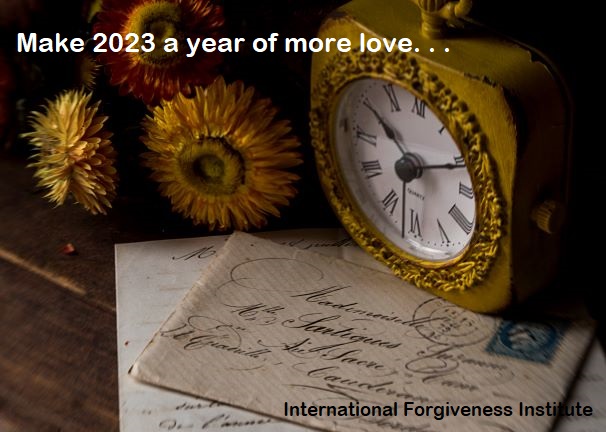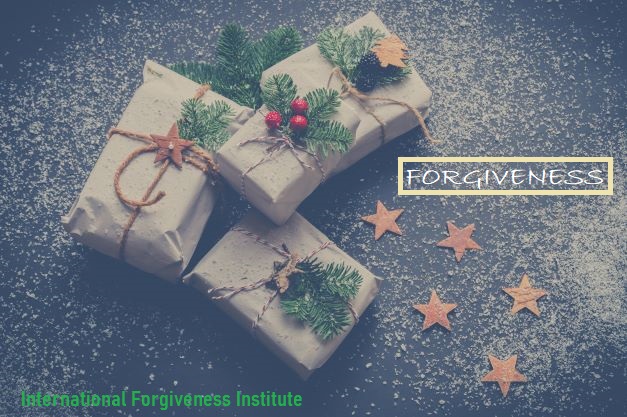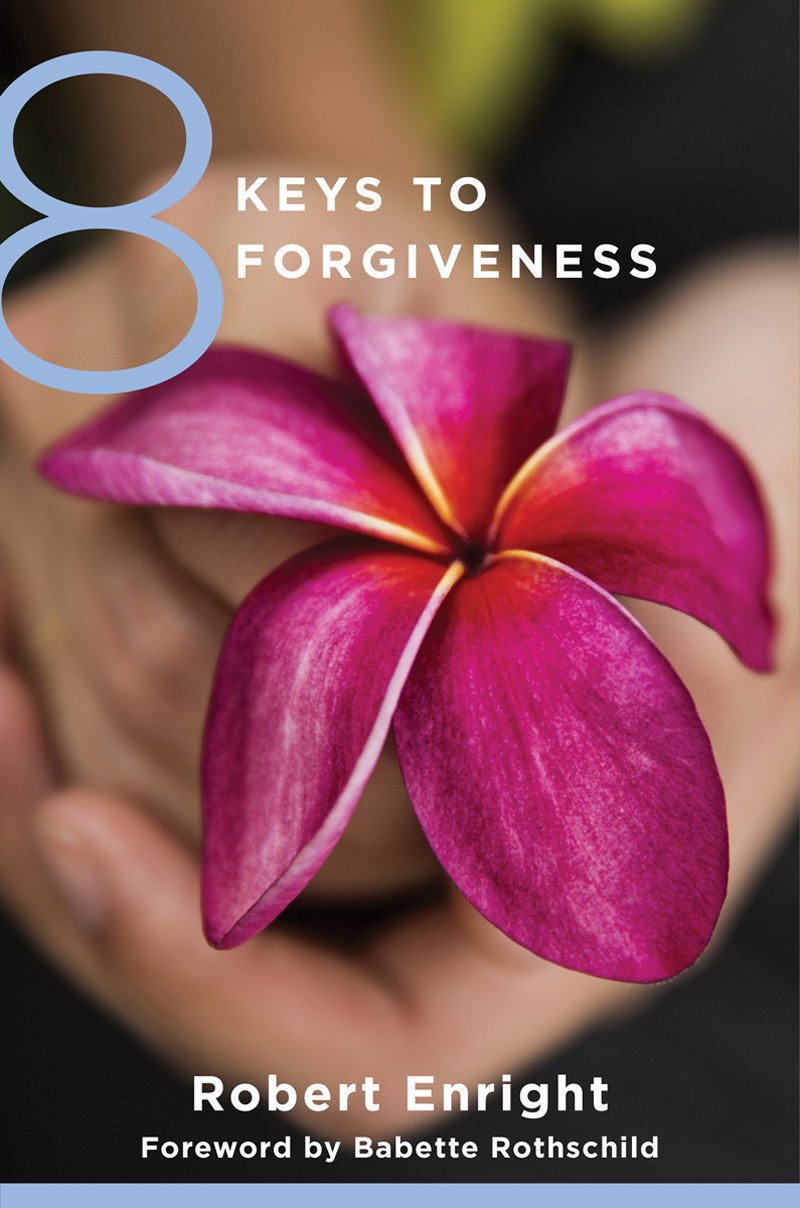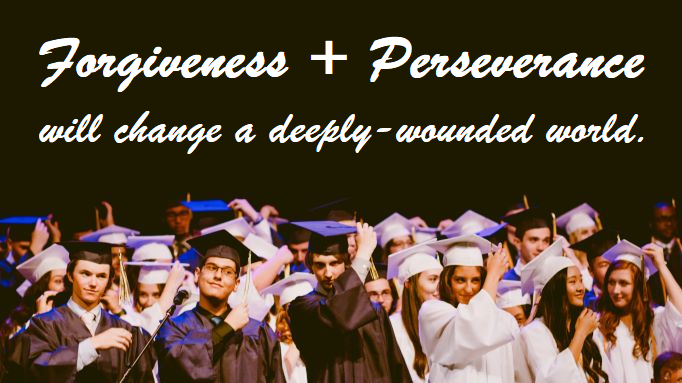Our Forgiveness Blog
A Tribute to Our Director
For those of you who have read the International Forgiveness Institute’s newsletters, news items, blogs, and other features on our website, you have our long-time Director, Dennis Blang, to thank for that. He has tirelessly shown a love for the moral virtue of forgiveness. He has long shown the moral virtue of perseverance as he has worked to constantly improve the website for the sake of those who want to know more about forgiveness and to make a better world.
It was Mr. Blang who contracted with web developers to constantly improve the site. Over the years he added the Research page, the forgiveness curriculum page, the videos from three different international conferences, the research scales page with free forgiveness instruments for all who are interested, and much more. There are close to 3,000 entries in what is the most comprehensive forgiveness website in the virtual world. For his efforts, this website was awarded The Best Websites of 2022 by The Good Estate, a multi-thematic review website where users can find high quality information about all kinds of digital and physical products. TheGoodEstate is a project of Global Commerce Media.
forgiveness curriculum page, the videos from three different international conferences, the research scales page with free forgiveness instruments for all who are interested, and much more. There are close to 3,000 entries in what is the most comprehensive forgiveness website in the virtual world. For his efforts, this website was awarded The Best Websites of 2022 by The Good Estate, a multi-thematic review website where users can find high quality information about all kinds of digital and physical products. TheGoodEstate is a project of Global Commerce Media.
It was Mr. Blang who oversaw the development of our online education course, Forgiveness Therapy, and encouraged students as they moved forward in the book. I always was so impressed with the care he would take with each student, answering questions and clarifying correct answers when a student would inquire about the right answer.
I have been amazed at his breadth of knowledge about the state-of-the-art in the world regarding forgiveness. He frequently would pass news items and journal articles my way, asking if I had seen them. In the vast majority of cases, these were hidden gems worthy of our time and he was the first to find them, write about them, and then post information on them for you, the readers.
His care for the donors, who so wonderfully support the spread of forgiveness across the world, shows his love for forgiveness and his deep respect and appreciation for those who give of their own provisions for good. His emails to them always are sincere, supportive, and special.
His care for those who have taken the time to write to us is equally noteworthy. Those emails come to us from all over the world. Some people write in because they are hurting and need care. Mr. Blang has taken the time to care for them as he has suggested resources and professionals who can aid each one in their healing. He has treated each person as special, unique, and irreplaceable, giving the time and attention that each one needs. Only someone who has a love for forgiveness and a love for hurting people could sustain such an effort. Thank you for your caring, Mr. Blang.
Dennis Blang has been a gift to the world of forgiveness and for that I am deeply grateful. He now will be retiring, opening up new chapters in his life with his wife, Carol. We at the International Forgiveness Institute want to thank Mr. Blang for being a champion of forgiveness. Without him, we would not be as far down the road of forgiveness as we are now. Thank you so very much, Mr. Blang. Your work has been invaluable and we appreciate you perhaps even more than you realize.
![]()
Perseverance as the Missing Piece to Family, School, and Community Forgiveness
Having studied the psychology of forgiveness since 1985 and having helped plant forgiveness education in schools since 2002, I have come to realize that there is another moral virtue that needs to exist alongside forgiving if forgiveness is to mature in minds, hearts, and groups. That virtue is perseverance, or the willed decision and action to keep going despite challenges and to not get distracted by other issues. In the ethical treatise, Virtues and Vices (attributed to Aristotle, but possibly written by one of his followers), the virtue of perseverance or endurance is said to exist alongside the virtue of courage and daring. I would add that perseverance will be a moral virtue as long as it is connected to both wisdom and justice (as well as courage) because it is good only if the goal to which people are dedicating a good part of their lives is fair and reasonable. Persevering in bank robbery, for example, is vice not virtuous.
Perseverance is rarely discussed in modern society as we play with our gadgets and move from one forum to another. This kind of quick movement is part of what the 17th century French philosopher, Blaise Pascal, in his masterful work, Pensées, refers to as diversion. He challenged readers by saying that most people cannot endure even one hour alone in their own room without seeking new diversions. If this was the case over four centuries ago, how much more might diversion be weakening our ability to engage in the moral virtue of perseverance now?

In an earlier blog, I related an interaction with Mr. Brian McParland of St. Vincent de Paul Primary School in Belfast, Northern Ireland in the fall semester of 2002. Upon approving forgiveness education in his school, he told me that I would last only 3 years at this task because that is all the time anyone ever seems to give to new classroom initiatives. In other words, people do not persevere. I have seen the same in local groups that start forgiveness education programs with adults only to have them fade over time. Yet, as Aristotle reminds us, and challenges us, it takes time to grow deeply in the moral virtues. We do not become proficient in any moral virtue by giving it a try for a little while any more than we become physically fit by hitting the gym for a month and then going back to the couch and the potato chips. It takes time and effort to become forgivingly fit. It takes time to grow in the moral virtue of perseverance.
So, it seems to me that the first step in growing intra-personally in forgiveness, in aiding families and schools and local community organizations to grow in forgiveness is to openly and boldly and persistently discuss perseverance and the serious challenge all people face as they say, “Let’s hit the forgiveness gym!” Without perseverance, we lose our forgiving fitness very soon.
How much perseverance do we need to change the world? It seems to me that we need to introduce students to forgiveness, without forcing them to forgive, from age 4 to age 18. It seems to me that we need two generations, about 40 years, of forgiveness in communities to change those communities and to change community-to-community conflicts, even brutal conflicts that seem at present to have no end in sight. Forty years? Forty years when there will be new distractions, new shiny diversions? Yes, and it is the teamwork of forgiveness and perseverance, and leaders who will take over for other leaders, that will win in the peace movement. This combination of forgiveness and perseverance never has been tried anywhere in the world at any time in human history. It is time.
With perseverance, we might just be able to bring forgiveness for good to a deeply wounded world. Long live perseverance! Long live forgiveness!
![]()
Your Unfolding Love Story for 2023
In March of 2014, we posted a reflection here in which we encouraged you to grow in love as your legacy of 2014. The challenge was this: Give love away as your legacy of 2014. We challenged you again in 2015…..and 2016……and we kept going.
Our challenge to you now is this: Give love away as your legacy of 2023.
One way to start is by looking backward at one incident of 2022. Please think of one incident with one person in which you were loved unconditionally, perhaps even surprised by a partner or a parent or a caring colleague.
Think of your reaction when you felt love coming from the other and you felt love in your heart and the other saw it in your eyes. What was said? How were you affirmed for whom you are, not necessarily for something you did? What was the other’s heart like, and yours?

(Image by StockSnap.io)
Can you list some specific, concrete ways in which you have chosen love over indifference? Love over annoyance? If so, what are those specifics and how are they loving? When it is January 1, 2024, and you look back on the year 2023, what will you see? Now is your chance to put more love in the world.
As one commitment to that love as expressed through forgiveness, you might consider signing our Forgiveness Pledge here: https://internationalforgiveness.com/forgiveness-pledge/
Tempus fugit. Your good will, free will, and strong will can point to a year of more love…..and the clock is ticking.
![]()
Consider Giving the Gift of Forgiveness This Year
In the season of giving, one of the most beautiful gifts you might consider giving is forgiveness. The ideas that forgiving is a gift to those who have hurt you sometimes gets forgiveness into trouble. In other words, people think it is irrational to consider offering a gift to those who are unfair. The typical reasons for this resistance to forgiveness as gift-giving are these:
- It is dangerous to reach out to those who act unfairly because I am open to further abuse.
- My gift-giving might be a signal to the misbehaving others that their actions are acceptable, which they are not.
- Gift-giving to those who acted unfairly seems counter-intuitive to my own healing. I need to move on and not focus on this other person.
 The ideas above can be countered this way: With regard to (A), you do not necessarily have to reconcile with an unrepentant person who keeps harming you. You can give your gift from a distance, such as a kind word about the person to others or an email so that you can keep your distance if this is prudent to do so. With regard to (B), you can forgive and ask for justice. Forgiving never means that the other just goes ahead as usual with hurtful behaviors. In other words, if you decide to forgive, you can and should ask for fairness from the other person. With regard to (C), forgiveness will seem counter-intuitive as goodness to those who are not good to you only if your focus is entirely on justice or a fair solution to the problem. If you begin to see that mercy (in the form of forgiving) and justice can and should exist side-by-side, then perhaps this idea of forgiveness as a contradiction or as inappropriate or as somehow odd may lessen in you.
The ideas above can be countered this way: With regard to (A), you do not necessarily have to reconcile with an unrepentant person who keeps harming you. You can give your gift from a distance, such as a kind word about the person to others or an email so that you can keep your distance if this is prudent to do so. With regard to (B), you can forgive and ask for justice. Forgiving never means that the other just goes ahead as usual with hurtful behaviors. In other words, if you decide to forgive, you can and should ask for fairness from the other person. With regard to (C), forgiveness will seem counter-intuitive as goodness to those who are not good to you only if your focus is entirely on justice or a fair solution to the problem. If you begin to see that mercy (in the form of forgiving) and justice can and should exist side-by-side, then perhaps this idea of forgiveness as a contradiction or as inappropriate or as somehow odd may lessen in you.
Forgiveness can be a gift in these ways:
- As you forgive, you are giving the other person a second chance at a trustworthy relationship with you. Of course, trust takes time to develop, but forgiveness opens the door, even if a little, to trying the trust-route with the other who behaved unjustly.
- Forgiveness can be a merciful way of showing the other what the injustice actually is (or was), making possible positive change in the other. Those who behave badly and are offered this mercy may begin to see the unfairness more clearly and have the inner conviction that change indeed is necessary.
- Forgiveness can be a gift to yourself as you shed abiding anger that could have been yours for many years. You have a second-chance at stronger mental health.
- As you reduce toxic anger, this actually can be an aid in strengthening your relationships with people who were not the ones who acted badly. After all, when people carry around a lot of anger in their hearts, they can displace that anger onto unsuspecting others. Your forgiving one person, then, can be a gift to others who do not have to endure your displaced anger.
So, then, what do you think? Do you see that in the season of giving, one of the most beautiful gifts you might consider giving is forgiveness?
![]()
How might people distort the process of forgiveness?
For decades, our group has been monitoring and trying to correct false definitions of what it means to forgive those who acted unjustly. For example, in defining what forgiving is, some authors have erroneously equated forgiveness with excusing the wrong done, automatically reconciling, and abandoning a quest for justice.
I have come to realize that even the process of forgiveness (how people go about forgiving) can be prone to misinterpretations, to errors in what actually occurs when a person engages in the process of forgiving. To correct these errors, let us consider four responses to these misconceptions.
- As a person walks the path of forgiveness, there is a tendency to say, “I have not done enough; I have not reached perfect forgiveness.” This kind of thinking expects too much of the forgiveness process. As Lewis Smedes said in his book, Forgive and Forget, forgiveness is for imperfect people. We rarely reach a perfect state of forgiving. We must be careful not to disparage ourselves if we still have some work to do on the forgiveness process once we exert time and effort on it. Often in our research, when people are gravely hurt by others and are very low in forgiving, they tend to go to the middle part of our forgiveness scale, not to the higher end. Yet, this progression makes all the difference as people shed excessive anger, anxiety, and depression, and can increase in self-esteem. The message here is this: Try to be temperate. On the one hand, do not expect perfect forgiveness. On the other, do not give it a half-hearted effort, concluding that, since you are not perfect, there is no need to keep trying. Strike the balance between too little effort and too high an expectation for you as a forgiver. You will know you are making progress as your anger lessens and as you wish the offending person well (as Smedes reminded us in his book).
- Here is another worry about the forgiveness process: “My process of forgiveness may create an expectation in the other that he now deserves to be back in my life.” Your engaging in the process of forgiveness may lead to a variety of different reactions in other people. Some may now demand reconciliation. This is not your fault. It is a misunderstanding on the part of the one who acted badly. Other people’s misinterpretation of your forgiving, of your goals in doing so, is not your error. It is the other’s error and so please do not hold yourself responsible (or the process of

Learn more about the process of forgiveness in this easy-to-use, step-by-step, how-to-forgive guide.
forgiveness responsible) for the other’s misinterpretation. You may have to clarify that your forgiving does not necessarily mean that you are ready to reconcile. The forgiveness process, as goodness toward others, remains good even if others misunderstand.
- Here is another: “My process of forgiveness may be so time consuming as to imbalance my full life.” This is another issue of intemperance. We can over-do (or under-do) just about anything. Be careful not to place forgiving so high on the priority list that you spend far too little time with loved ones, or neglect your job, or fail to get adequate exercise or rest. The process of forgiveness is part of a complete life.
- And here is our fourth worry about the forgiveness process: “Even as I engage in the process of forgiveness, I may not end all anger.” This kind of fear is common. People want to be done with anger and discontent which are effects of the unjust treatment against them. Even if all anger does not subside, in all likelihood, as you practice forgiving, and then try again…..and then again…..the anger lessens. You, then, are in control of the anger rather than the anger controlling you.
The definition of forgiveness can be distorted. Understanding the process of forgiving can be distorted. Do not let these distortions deter you from the life-giving practice of forgiving.




